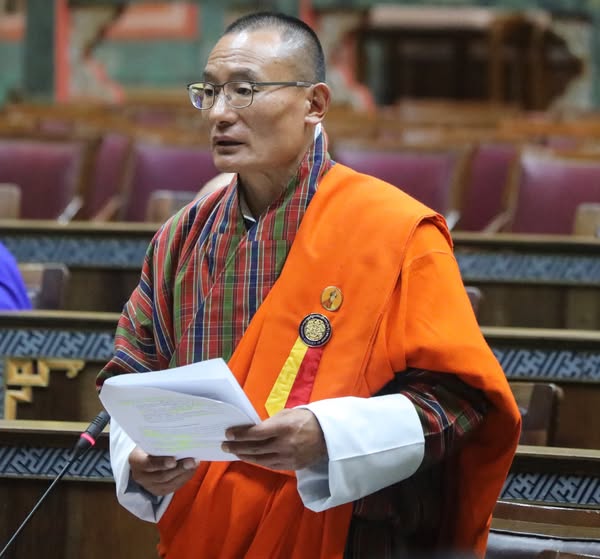
Bell Curve and PME Category also under scrutiny
NGWANG JAMPHEL
Thimphu
The contentious Managing for Excellence (MaX) system, introduced in 2016 to evaluate civil servants, continues to spark heated debate in the National Assembly.
During the 8th Sitting of the Second Session, discussions centered on a motion to abolish the bell-curve methodology and the “Partially Meeting Expectations” (PME) category, with concerns raised over its impact on civil service morale, performance, and attrition rates.
The MaX system was designed to enhance performance by aligning individual efforts with organizational goals. It uses a forced ranking system, requiring a set percentage of employees to fall into specific performance categories, including the PME category. Critics argue this rigid structure fosters dissatisfaction and contributes to high attrition rates.
The system replaced the previous performance appraisal framework, which often rated employees highly despite perceptions of inefficiency. The Royal Civil Service Commission (RCSC) claims MaX addresses inflated performance ratings by ensuring differentiation among employees, but its forced ranking approach has faced significant backlash.
The Good Governance Committee (GGC) has been vocal about the need for reform. In its report during the First Session, the GGC cited data suggesting that 89% of civil servant resignations were linked to the MaX system. It recommended abolishing the PME category and the bell curve, proposing a fairer alternative for performance evaluation.
Chairperson of GGC, Lhakpa Tshering Tamang clarified that the aim was not to discard the entire MaX system but to remove the forced ranking component, which has caused significant dissatisfaction among civil servants. He emphasized the need to strike a balance between accountability and fostering a supportive work environment.
The RCSC, an independent constitutional body, has defended the MaX system, arguing that the National Assembly’s resolutions are advisory and cannot mandate changes. Citing Article 26 of the Constitution, the RCSC asserted its exclusive authority over civil service performance management.
The Commission contested the GGC’s claim linking 89% of resignations to the MaX system, highlighting discrepancies in data. According to RCSC studies, primary reasons for resignations included family or personal matters (25.66%), further education (16.81%), and better opportunities (11.50%). A 2024 collaborative study with Harvard Extension School identified dissatisfaction with the overall system and higher income prospects abroad as key factors, rather than solely attributing attrition to MaX.
Data from the RCSC indicates fluctuating attrition rates in recent years. While rates were 8.62% in 2022 and peaked at 16.33% in 2023, they declined to 5.17% in 2024. Professional groups with the highest attrition rates included legal with 8%, ICT with 7%, and finance and audit with 7% sectors. Despite criticisms of MaX, the RCSC argues these figures suggest that performance management alone is not the primary driver of attrition.
The education sector, which accounts for 35% of the civil service, experienced a similar trend. Attrition rates dropped from 16.33% in 2023 to 5.17% in 2024, indicating potential improvements despite continued implementation of the MaX system.
Prime Minister Tshering Tobgay while presenting the report emphasized the government’s commitment to maintaining high performance standards in the civil service while addressing concerns raised by civil servants. Acknowledging the limitations of the National Assembly in altering the MaX system, he highlighted ongoing consultations with the RCSC to refine the framework.
The Prime Minister reiterated the importance of balancing accountability with civil servant morale. “We are committed to working collaboratively with the RCSC to address concerns and ensure the civil service transformation continues without compromising the motivation of our civil servants,” he stated.
The RCSC defended the bell-curve methodology, citing its global application in performance management systems. Countries like Singapore and Malaysia employ similar frameworks to align individual performance with national objectives. The RCSC argued that while forced rankings can lead to dissatisfaction, they address inflated ratings and ensure accountability.
The Commission also proposed interventions to support PME candidates rather than removing them from the system entirely. These interventions aim to help underperforming employees improve, thereby mitigating the adverse effects of forced rankings.
During the deliberations, Members of Parliament (MPs) raised concerns about the adverse effects of forced rankings, particularly the PME category. They argued that the practice delays promotions, heightens attrition rates, and fosters conflicts within the civil service. Many MPs emphasized the importance of recognizing human values and fostering a supportive environment.
Several MPs questioned the RCSC’s accountability, suggesting that it should be answerable to the executive and the Prime Minister. Others, however, highlighted the constitutional provisions safeguarding the RCSC’s autonomy, asserting that neither the government nor Parliament could unilaterally alter the MaX system.
The discussions also revealed gaps in grievance redressal mechanisms for civil servants. MPs advocated for the establishment of an independent tribunal to address workplace issues, a proposal that garnered broad support in the House.
After lengthy deliberations, the National Assembly did not accept the report on the MaX system, with only 18 out of 46 Members present voting in support. However, the motion to abolish the forced ranking component remains open for further follow-up in subsequent sessions, as per Section 103 of the National Assembly’s Rules of Procedure.
The Prime Minister assured the House that discussions with the RCSC would continue to explore refinements to the system. The goal, he emphasized, is to ensure a performance management framework that aligns with His Majesty’s vision for a professional and efficient civil service while addressing the concerns of civil servants.





